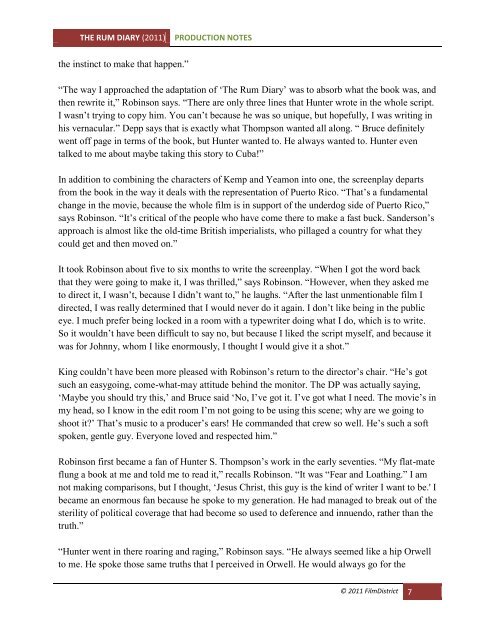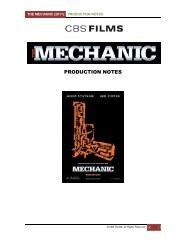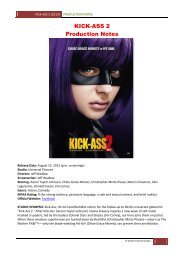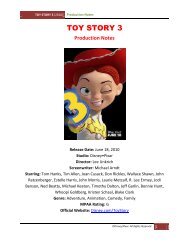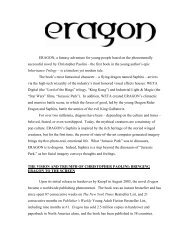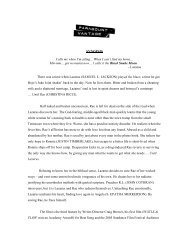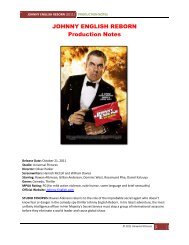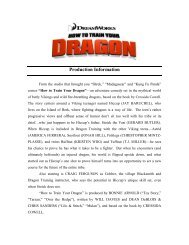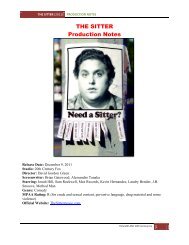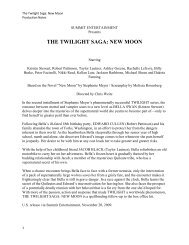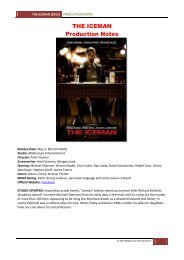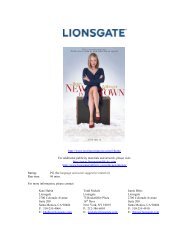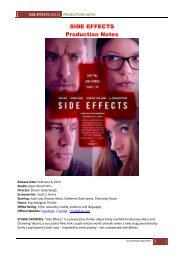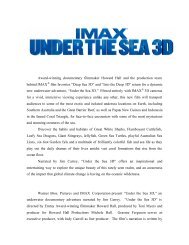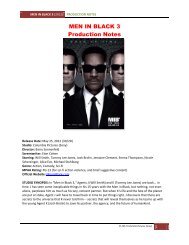THE RUM DIARY Production Notes - Visual Hollywood
THE RUM DIARY Production Notes - Visual Hollywood
THE RUM DIARY Production Notes - Visual Hollywood
You also want an ePaper? Increase the reach of your titles
YUMPU automatically turns print PDFs into web optimized ePapers that Google loves.
<strong>THE</strong> <strong>RUM</strong> <strong>DIARY</strong> (2011)<br />
PRODUCTION NOTES<br />
the instinct to make that happen.‖<br />
―The way I approached the adaptation of ‗The Rum Diary‘ was to absorb what the book was, and<br />
then rewrite it,‖ Robinson says. ―There are only three lines that Hunter wrote in the whole script.<br />
I wasn‘t trying to copy him. You can‘t because he was so unique, but hopefully, I was writing in<br />
his vernacular.‖ Depp says that is exactly what Thompson wanted all along. ― Bruce definitely<br />
went off page in terms of the book, but Hunter wanted to. He always wanted to. Hunter even<br />
talked to me about maybe taking this story to Cuba!‖<br />
In addition to combining the characters of Kemp and Yeamon into one, the screenplay departs<br />
from the book in the way it deals with the representation of Puerto Rico. ―That‘s a fundamental<br />
change in the movie, because the whole film is in support of the underdog side of Puerto Rico,‖<br />
says Robinson. ―It‘s critical of the people who have come there to make a fast buck. Sanderson‘s<br />
approach is almost like the old-time British imperialists, who pillaged a country for what they<br />
could get and then moved on.‖<br />
It took Robinson about five to six months to write the screenplay. ―When I got the word back<br />
that they were going to make it, I was thrilled,‖ says Robinson. ―However, when they asked me<br />
to direct it, I wasn‘t, because I didn‘t want to,‖ he laughs. ―After the last unmentionable film I<br />
directed, I was really determined that I would never do it again. I don‘t like being in the public<br />
eye. I much prefer being locked in a room with a typewriter doing what I do, which is to write.<br />
So it wouldn‘t have been difficult to say no, but because I liked the script myself, and because it<br />
was for Johnny, whom I like enormously, I thought I would give it a shot.‖<br />
King couldn‘t have been more pleased with Robinson‘s return to the director‘s chair. ―He‘s got<br />
such an easygoing, come-what-may attitude behind the monitor. The DP was actually saying,<br />
‗Maybe you should try this,‘ and Bruce said ‗No, I‘ve got it. I‘ve got what I need. The movie‘s in<br />
my head, so I know in the edit room I‘m not going to be using this scene; why are we going to<br />
shoot it?‘ That‘s music to a producer‘s ears! He commanded that crew so well. He‘s such a soft<br />
spoken, gentle guy. Everyone loved and respected him.‖<br />
Robinson first became a fan of Hunter S. Thompson‘s work in the early seventies. ―My flat-mate<br />
flung a book at me and told me to read it,‖ recalls Robinson. ―It was ―Fear and Loathing.‖ I am<br />
not making comparisons, but I thought, ‗Jesus Christ, this guy is the kind of writer I want to be.' I<br />
became an enormous fan because he spoke to my generation. He had managed to break out of the<br />
sterility of political coverage that had become so used to deference and innuendo, rather than the<br />
truth.‖<br />
―Hunter went in there roaring and raging,‖ Robinson says. ―He always seemed like a hip Orwell<br />
to me. He spoke those same truths that I perceived in Orwell. He would always go for the<br />
© 2011 FilmDistrict 7


